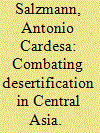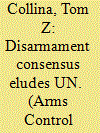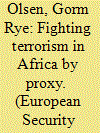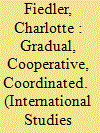|
|
|
Sort Order |
|
|
|
Items / Page
|
|
|
|
|
|
|
| Srl | Item |
| 1 |
ID:
134211


|
|
|
|
|
| Publication |
2014.
|
| Summary/Abstract |
This article appraises the Central Asian Countries' Initiative on Land Management (CACILM) as an innovative experience of regional co-operation to implement the Convention on Desertification. Despite high initial expectations, the actual implementation process has suffered drawbacks. The Central Asian countries' commitment and capacity to sustain this process depends heavily on international support. Moreover, the process's low political profile and the weak capacities of the Central Asian authorities to engage in meaningful transnational co-operation are significant hurdles to be tackled. At the same time, national and regional efforts to combat soil degradation and desertification have not yet been properly mainstreamed with other more consolidated processes for the sustainable management of natural resources, such as the IFAS. It is argued that this may be a possible solution for the future of CACILM.
|
|
|
|
|
|
|
|
|
|
|
|
|
|
|
|
| 2 |
ID:
128074


|
|
|
|
|
| Publication |
2013.
|
| Summary/Abstract |
As they complete their annual debate on disarmament and international security, the member states of the United Nations continue to struggle to agree on where to focus their efforts. The next logical step for many, a global ban on the production of fissile materials for nuclear weapons, has been effectively blocked by Pakistan.
Meanwhile, international support is growing to move directly to the elimination of nuclear weapons, which the declared nuclear powers oppose.
|
|
|
|
|
|
|
|
|
|
|
|
|
|
|
|
| 3 |
ID:
131632


|
|
|
|
|
| Publication |
2014.
|
| Summary/Abstract |
The French intervention in Mali in early 2013 emphasizes that the decision-makers in Paris, Brussels, and Washington considered the establishment of the radical Islamist regime in Northern Mali a threat to their security interests. The widespread instability including the rise of radical Islamist groups in Somalia was perceived as a threat to western interests. It is the core argument of the paper if western powers decide to provide security in Africa, they will be inclined to use proxy instead of deploying own troops. Security provision by proxy in African means that African troops are doing the actual fighting and peacekeeping on the ground while western powers basically pay the costs, the logistics, and the training of local African troops. The paper concludes that the African Union Mission in Somalia (AMISOM) in Somalia and The African-led International Support Mission to Mali (AFISMA) in Mali are proxies for the USA and the European Union.
|
|
|
|
|
|
|
|
|
|
|
|
|
|
|
|
| 4 |
ID:
171774


|
|
|
|
|
| Summary/Abstract |
This article analyzes the success factors for external engagement aimed at fostering peace in conflict-affected states. It focuses on a set of three factors that have been under-researched so far: the strategic prioritization between stability and democracy, the degree of coordination, and the mode of interaction. We compare international engagement in six countries—Burundi, Kenya, Kyrgyzstan, Nepal, Senegal, and Timor-Leste. These countries all struggled with violent conflict and experienced a democratic transition in the period 2000–2014. We use an innovative approach to assess the impact of external engagement by analyzing twenty critical junctures in the domestic political processes of these countries mainly linked to elections, constitution-writing processes, and peace agreements, as well as disarmament, demobilization, and reintegration. Based on over 300 interviews, we find that prioritizing stability over democratization is problematic, good international coordination has positive effects, and preferring cooperative forms of interaction over coercion is mostly but not always useful. In discussing these general features of international support, this article contributes to the broader discussion of factors that explain the impact external actors can have on transformative political processes after conflict.
|
|
|
|
|
|
|
|
|
|
|
|
|
|
|
|
| 5 |
ID:
156924


|
|
|
|
|
| Summary/Abstract |
This article demonstrates that there are multiple strategies for state building, peace building, and security for civilian populations. In five cases of ongoing conflict, the liberal model of top-down state building and elections has caused considerable loss of lives and resources and could be considered to have failed. There are no long-term prospects for success in any of the five countries where the liberal model is being implemented with international assistance. The liberal model of power sharing followed by democratic elections has not provided greater protection from internal and external threats than would have one or more of the alternatives in four of the cases. In three of the cases, where there has been considerable bloodshed and displacement, freezing the conflict, separating the factions, and providing protection for civilian populations is an option that is less costly than the liberal model. Where conflicts are frozen, there can be international assistance for building the state in two or more sections. Where long-term prospects in building a unitary state are not good, freezing the conflict, protecting civilians, and sealing borders, as well as building the state from below, are less costly than the liberal model.
|
|
|
|
|
|
|
|
|
|
|
|
|
|
|
|
|
|
|
|
|